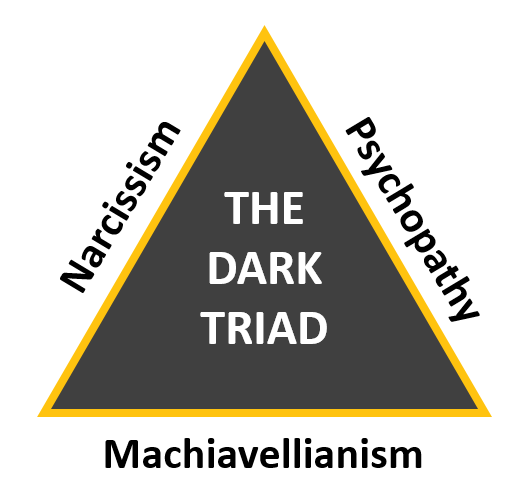
Imagine that you’ve got two types of people in a company. There is one kind that is selfish, manipulative, aggressive and cold-hearted. On the other hand, you have the sort of people who are friendly, warm, supportive and honest. Which one would you like to have as your boss? I guess the answer is obvious to most of us. Why is it then that so many toxic people become successful and powerful?

You may wonder how toxic people manage to reach their positions. How can they rise to the top if they are total jerks? Research shows that their key to success lies not only in management skills but also in specific personality traits. Let’s start with The Dark Triad.
The Dark Triad and toxic personality
The Dark Triad is a concept in psychology that describes three aversive qualities: narcissism, Machiavellianism and psychopathy. Narcissism consists of constant seeking for attention and willingness to be in the center to an extreme degree. Machiavellianism is a tendency to exploit others, whereas psychopathy is characterized by low empathy and heartlessness in social situations.

All of these traits have a lot in common with toxic behavior in the workplace. It’s because such qualities make manipulation and exploiting others easy [1]. Moreover, people scoring high on these traits are more likely to commit crimes, cause social distress and act less empathetically toward others. That of course, in combination with power, is a dangerous mix in a corporate environment.
Having high political skills
Klaus Templer from the Singapore University of Social Sciences has also observed that there were plenty of toxic people who got to the top in huge companies and politics. He decided to investigate why toxic people get ahead at work so successfully. In his study [2], Templer asked employees and their supervisors working in various Singaporean organizations to rate their “political skills”. He assessed it based on their abilities to network with other people, behaving “correctly” in social situations, minding body language and knowing how to make people to like them. Supervisors also rated their employee’s performance and team work from their perspective.
Templer found out that people high on The Dark Triad were more likely to receive high scores in terms of “political skills”. Simply speaking, “dark” employees received good performance ratings through their high political skills.
Evolutionary perspective
From an evolutionary perspective “dark” traits may be selected if they are used for one’s advantage. It’s like with mating games. The stronger wins. It’s pretty much the same with corporate careers. People with strong manipulation skills and those who benefit from others may achieve better results at work, especially in short-term.
A study [3] conducted by Daniel Spurk from the University of Bern conforms to that idea. He and his colleagues analyzed how each “dark” trait impacted career success. As an objective measure they chose salary and leadership position. And to measure subjective satisfaction they analyzed personal career satisfaction.
As a result, the study proved that narcissism was positively related to salary, Machiavellianism was positively related to leadership position and career satisfaction. But psychopathy was negatively related to all analyzed outcomes. That provides another answer why toxic people are able to advance their careers.
Bosses reward people similar to themselves
Another explanation comes from the fact that we like people who are similar to ourselves [4]. Typically supervisors reward people with a similar mindset. Those who behave the same way they do and those who are almost like them, their buddies. And dark people know how to make other people to like them. That includes top managers and other influential people.

That’s why toxic employees are quite often able to advance into leadership positions. It can sometimes be a vicious circle. Toxic people, who got to the top, promote other people similar to them, so that they can serve important roles in companies as well.
What about humble people?
But does it mean that humble people cannot be top managers or they are simply less effective managers? No, that’s not the case. According to the study [2], toxic people are not necessarily the best performers on a team. They just have different abilities and skills that allow them to play different roles in organizations.
“(…) honest and dark employees have different means to receive positive performance appraisals.”
Templer observed that there is a positive relationship between humility and team facilitation. It means that people who scored low on The Dark Triad were much better at being team players. They could play a role of a team leader or a facilitator. Thanks to their honesty and friendliness they were able to energize people and increase job satisfaction.
On the other hand, toxic individuals can perform better in tough situations, which generate a lot of stress. That’s why they get hired when there is a need for cost cutting, closing whole departments or firing people. They just need to get the job done.
Conclusion
Dark Triad elements are the core of a toxic personality. There are many studies that proved such traits can play an important role in getting to the top managerial positions. But every coin has two sides. “Dark” personalities are more likely to finish their careers in some form of disrepute. It’s because of their tendency to act unethically and commit fraud.
And whether you like it or not, organizations, especially huge ones, need both types of people. Those who can be great leaders and facilitators but also those who can be the bad cop. You just need to find out how to work with toxic people and how to cope with them.
If you’re interested to measure your Dark Triad personality traits, you can check it out here.
References
[1] Kajonius, Petri & Persson, Björn & Rosenberg, Patricia & Garcia, Danilo. (2015). The (mis)measurement of the Dark Triad Dirty Dozen: Exploitation at the core of the scale. 10.7287/PEERJ.PREPRINTS.1605V1.
[2] Templer, Klaus J. (2018). Dark personality, job performance ratings, and the role of political skill: An indication of why toxic people may get ahead at work. Personality and Individual Differences. 124. 209-214. 10.1016/j.paid.2017.11.030.
[3] Spurk, Daniel & Keller, Anita & Hirschi, Andreas. (2015). Do Bad Guys Get Ahead or Fall Behind? Relationships of the Dark Triad of Personality With Objective and Subjective Career Success. Social Psychological and Personality Science. in press. 10.1177/1948550615609735.
[4] Hampton, Adam & Fisher Boyd, Amanda & Sprecher, Susan. (2018). You’re like me and I like you: Mediators of the similarity–liking link assessed before and after a getting-acquainted social interaction. Journal of Social and Personal Relationships. 36. 026540751879041. 10.1177/0265407518790411.